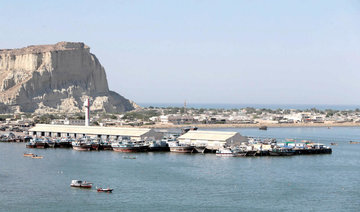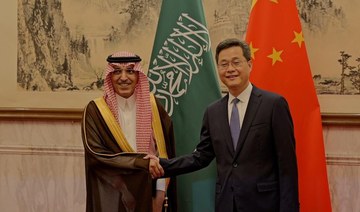GWADAR, Pakistan: Remote and impoverished, Pakistan’s Gwadar port at first glance seems an unlikely crown jewel in a multi-billion-dollar development project with China aimed at constructing a 21st century Silk Road.
Situated on a barren peninsula in the Arabian Sea, Gwadar, or the “gate of the wind,” owes its fortuitous selection as Pakistan’s next economic hub to its strategic location near the Strait of Hormuz.
The city is set to become the bridgehead for the China-Pakistan Economic Corridor (CPEC), a $54 billion (SR202.50 billion) project launched in 2013 linking western China to the Indian Ocean via Pakistan.
The corridor is one of the largest projects in Beijing’s “One Belt One Road” initiative, comprising a network of roads and sea routes involving 65 countries.
The Chinese-financed initiative aims to connect the country with Africa, Asia and Europe through a vast network of ports, railways, roads and industrial parks.
But for Pakistan, participating in the project presents an enormous challenge in a country plagued by weak institutions, endemic corruption and a range of insurgencies in areas slated to host the corridor.
“This port is going to help Pakistan make linkages with neighboring countries. The entire nation will be getting benefits out of Gwadar,” Dostain Khan Jamaldini, chairman of the Gwadar Port Authority, told reporters.
But “the first beneficiaries of this port will be the people of Gwadar.”
The subject of economic dividends is extremely sensitive in resource-rich Balochistan — one of Pakistan’s poorest and most violent provinces, where separatist insurgencies have been waged for decades.
Since the beginning of the project militants have repeatedly attacked construction sites and targeted Chinese workers.
The project includes the country’s first deep-water port, a free-trade zone and 50 kilometers of dock space.
“Gwadar port is not Chinese, our strong partner is Chinese and we appreciate their boldness,” said Jamaldini.
“They came to Gwadar when nobody was accepting the idea to come and visit.”
China has eyed Gwadar for years.
Beijing financed an earlier scheme to develop the port prior to 2007, which was later overseen by a Singaporean group. But following bouts of insecurity, the Singaporeans handed it back to the Chinese in 2013.
The ambitious corridor is also far from popular in the region. India makes no mystery of its reservations over an infrastructure project that crosses through disputed Kashmiri territory.
This month US Defense Secretary Jim Mattis raised concerns about the issue, sparking a fierce backlash in Pakistan and claims Washington was trying to “contain China” in favor of arch-rival India.
Beyond diplomatic concerns, security remains a key issue in Gwadar, according to Brig. Kamal Azfar, who heads “Brigade 440” — a security outfit created to protect CPEC projects and personnel.
Hostile forces are trying to “scuttle or stall CPEC,” he said in reference to accusations India has backed insurgents hostile to the project.
The area also lacks water and electricity, which developers hope will be remedied by dams and desalination plants outlined in the scheme.
Officials also worry the peninsula will fall victim to real estate speculation. Property prices near the port doubled between 2014 and 2016, said Sajjad Baloch, the director of the Gwadar Development Authority, before falling 20 percent.
And despite promises of future prosperity, skilled labor is lacking, says Mohamed Siddique, who runs a local hospital. Even with modern facilities it operates at a limited capacity because of a dearth of specialists.
In Gwadar city, economic activity spurred by CPEC remains limited. A lone freighter was anchored in the port during AFP’s recent visit. Only three to four arrive every month, according to port authorities.
The expressway leading to the site is unfinished.
About 300 Chinese people working on various projects live in prefabricated houses on the port — coined Chinatown — but only venture out with a security escort.
The city itself, with a population of about 100,000 that is projected by one estimate to jump tenfold by 2050, has relied on fishing and the artisanal construction of boats for generations.
Up to 50,000 people, mostly fishermen, could be “gradually” resettled to make way for the project, Baloch said, adding the potential move could see them relocated to a “state-of-the-art jetty.”
The first priority for the jobs will go to Gwadaris, “then to the Balochis, then to the people of any part of Pakistan,” Baloch said.
However few Gwadaris have been hired at the port, according to locals building boats on a nearby beach.
“We are hoping to get a job there,” said Juneid.
For others, it’s a chance to right the wrongs of past subjugation.
“Balochistan province should get the maximum benefits instead of outsiders,” said Abdullah Usman, 47, a social worker.
“It will be unfortunate if the local Baloch do not benefit... that would cause an increase in the several decades long sense of deprivation.”
At a forgotten Pakistan port, China paves a new Silk Road
At a forgotten Pakistan port, China paves a new Silk Road
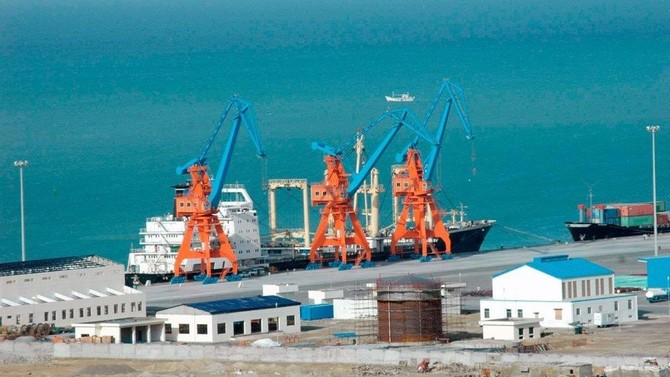
Pakistan to enhance production of indigenous petroleum products— minister
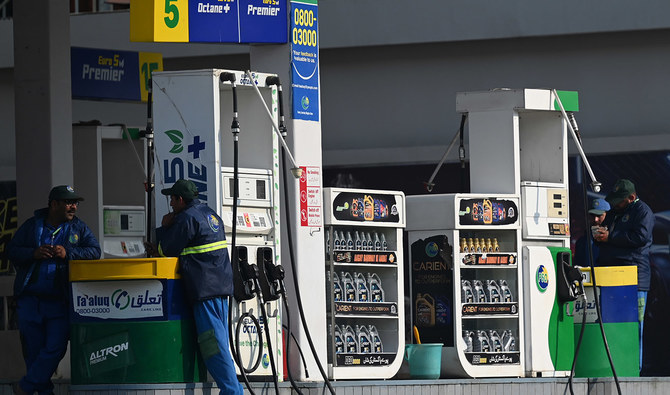
- Cash-starved Pakistan spends over $20 billion each year on petroleum imports to meet energy demand
- Pakistan welcomes foreign companies to invest in its oil and gas sector, says Petroleum Minister Musadik Malik
KARACHI: Pakistan wants to enhance the production of its indigenous petroleum products, Petroleum Minister Musadik Malik said on Wednesday, citing the financial burden that expensive crude oil imports have on the country’s fragile economy.
Cash-strapped Pakistan relies heavily on imported petroleum products as its energy demands grow. Struggling with a balance of payments crisis, high inflation and steep currency devaluation, Pakistan is looking to secure cheaper energy imports and find alternate ways to lessen the cost of power generation.
According to the Trade Development Authority of Pakistan (TDAP), the country’s indigenous oil production meets only about one-fifth of Pakistan’s current oil needs. The rest is met through high-cost imports.
Prime Minister Shehbaz Sharif has urged the government to turn toward renewable energy resources. Last month, he said the country currently imports oil worth $27 billion to meet its power and transportation needs, which puts a strain on the cash-strapped nation.
Speaking at the Pakistan Energy Symposium, Malik said it would be difficult to manage the country with such a huge energy import bill when Pakistan’s exports were around $30 billion.
“We want to first of all, produce as much of the petroleum products, including gas and crude, indigenously as much as possible,” the minister said, adding that the government has put blocks for bidding and is actively trying to attract global players in exploration activities.
Malik said the government is expediting oil and gas exploration within the country, adding that it welcomes foreign companies to invest in the sector.
“So, we are telling the world that Pakistan is open for business, our regulatory process, particularly the petroleum concession process is very dense and opaque,” he said.
He said investment processes and information about oil and gas exploration have been digitized and simplified to facilitate the government’s aims to enhance indigenous production of energy resources.
Malik advocated for increasing the utilization of Pakistan’s abundant renewable energy resources, pointing out that the country’s solar energy costs have significantly decreased.
Closing Bell: Saudi benchmark index edges up to close at 12,157
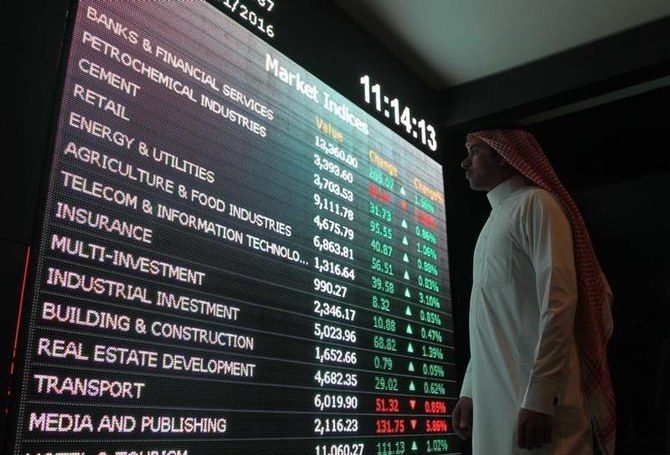
RIYADH: Saudi Arabia’s Tadawul All Share Index rose on Wednesday, gaining 34.55 points, or 0.28 percent, to close at 12,157.03.
The total trading turnover of the benchmark index was SR5.3 billion ($1.413 billion), as 54 stocks advanced while 136 retreated.
Similarly, the MSCI Tadawul Index increased slightly by 3.54 points, or 0.23 percent, to close at 1,523.94.
However, the Kingdom’s parallel market Nomu dipped by 88.34 points, or 0.33 percent, to close at 26,845. This comes as 25 stocks advanced while as many as 35 retreated.
The best-performing stock was Naseej International Trading Co., whose share price surged 9.81 percent to SR81.70.
Other top performers included Gulf General Cooperative Insurance Co. and Makkah Construction and Development Co., whose share prices soared by 6.68 percent and 6.01 percent, to stand at SR15.02 and SR97 respectively.
Saudi Cable Co. and Saudi Ground Services Co. also performed well.
The worst performer was Amlak International Finance Co., whose share price dropped by 5.03 percent to SR11.34.
Batic Investments and Logistics Co. as well as Al-Jouf Agricultural Development Co., share prices dropped by 4.94 percent and 4.37 percent to stand at SR3.27 and SR63.50, respectively.
On the announcements front, Saudi IT company Rasan has set the final offering price for its upcoming initial public offering on the Kingdom’s stock market at the upper limit of SR37 per share.
This follows the successful completion of the book-building process for institutional investors, which saw the offering oversubscribed approximately 129.1 times the total offer shares.
Institutions subscribed to the entire offering, with 22.74 million ordinary shares allocated to them, representing 100 percent of the total holdings offered in the first phase.
This information comes from a statement issued by Saudi Fransi Capital, the IPO manager, as well as the financial advisors and book-runners for the institutional tranche, Saudi Fransi Capital and Morgan Stanley Saudi Arabia.
The statement on Tadawul added that following the successful completion of the book-building process, up to 2.274 million ordinary shares, representing 10 percent of the total holdings offered, will be allocated to individual investors in the second phase.
Saudi aviation sector surges with over $20bn in deals at Riyadh forum
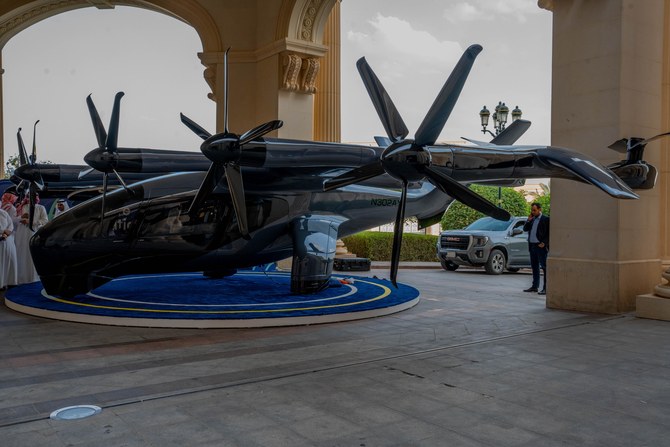
RIYADH: Saudi Arabia’s aviation sector received a major boost with over 100 agreements, exceeding SR75 billion ($20 billion), signed during the first two days of the Future Aviation Forum.
The Riyadh event saw the signing of 102 memorandums of understanding and deals, ranging from aviation services to aircraft procurement, cargo and logistics services, and advanced air mobility.
Abdulaziz Al-Duailej, president of the General Authority of Civil Aviation, said that the outcomes of the forum have exceeded all expectations.
“Over the first and second days, agreements, deals, and partnerships were established that will work toward enhancing global aviation connectivity. This underscores the international confidence in the Saudi civil aviation system and its capability to take on a leading role in this pivotal sector,” said Al-Duailej.
The most significant agreement was signed between the Saudia Group and Airbus for an order to buy an additional 105 A320neo family planes, marking the largest aircraft deal with the European firm in the Kingdom’s history.
The $19 billion deal, which includes A320neo and A321neo models, will see the aircraft distributed between Saudia and flyadeal, the group’s low-cost carrier.
Meanwhile, Saudi oil giant Aramco signed a deal with Bombardier for the purchase of two new super mid-sized Challenger 3500 business jet aircraft, with delivery scheduled for 2025 and 2026.
Additionally, BAE Systems inked a deal with the Saudi Academy of Civil Aviation to exchange experience in aviation science training.
Other agreements included a five-year contract signed between Saudia Cargo and Saudia Technic to lease up to 8,474 sq. m. within the Saudia Technic premises located in King Abdulaziz International Airport, MRO Village.
The deals also involved NEOM agreeing with Saudia Technic to engage in future discussions and collaboration in the field of aircraft maintenance, repair, and overhaul of heavy-lift Uncrewed Air System, or UAS, and passenger electric vertical take-off and landing, known as eVTOL, aircraft.
Matarat Holding Co. and the Local Content and Government Procurement Authority agreed to foster collaboration to enhance opportunities and potential for the development and advancement of local content.
Additionally, Dammam Airport Co. signed a consulting service contract with Hill International to manage DACO projects. It also sealed a cooperation agreement with the Bahrain Airport Co. Furthermore, it inked a training MoU with the Gulf Aviation Academy.
The agreements also included Saudi Arabia signing air service deals with Mozambique, Cambodia, Eswatini, and Brunei, as well as Romania, Malawi, and Belize. Additionally, the Kingdom signed similar deals with Kiribati, Grenada, Lithuania, and Sao Tome and Príncipe, as well as Salvador and Albania.
The forum witnessed a strong turnout, with over 30 ministers, 77 leaders of civil aviation authorities, CEOs from airlines worldwide, and 7,000 industry experts and leaders from over 120 countries.
During the forum, GACA unveiled the inaugural edition of the “State of Aviation” report, showcasing the sector’s contribution to the Kingdom’s economy, totaling $53 billion, and its role in generating 958,000 jobs across different regions.
GACA also hosted the first exhibition aimed at facilitating investment in the Saudi aviation sector, with a focus on the advanced air mobility pavilion being among the exhibition’s prominent pavilions.
Qatar issues green bonds worth $2.5bn

RIYADH: Qatar has issued green bonds in two tranches totaling $2.5 billion, according to official data.
Citing a release from the International Financing Review, Reuters reported that the operation is the Gulf state’s first external debt issuance in four years.
According to the IFR report, Qatar sold five-year offerings worth $1 billion with a yield of 30 basis points above US treasury bonds, and ten-year debt securities worth $1.5 billion with a yield of 40 basis points.
This comes several months after global professional services network KPMG encouraged the Gulf country to issue green bonds and adopt sustainable financing mechanisms, saying that this step would help the country achieve its sustainability goals.
The report also showed that Qatar reduced the initial indicative rate to 70 basis points over US treasury bonds for five-year debt securities and 80 basis points over US treasury bonds for 10-year offerings after receiving total orders exceeding $10.9 billion.
On another note, new data revealed that in the first quarter of 2024, Qatar recorded a merchandise trade balance surplus of 53.2 billion Qatari riyals ($14.6 billion), down from 68.4 billion riyals in the same quarter last year.
Issued by the country’s National Statistics Center, the analysis also disclosed that the value of Qatar’s total exports, including foreign sales of domestic goods and re-exports, amounted to 87.6 billion riyals, reflecting an 8.6 percent drop compared to the corresponding period in 2023.
On the other hand, during the same period, the value of Qatar’s imports stood at 34.4 billion riyals, reflecting a 25.4 percent surge in comparison to the first quarter of 2023.
When asked about the issuance of external debt in January, Qatar’s Finance Minister Ali Al-Kuwari, said: “We’re ready to do it very soon.”
Speaking to Bloomberg Television on the sidelines of the World Economic Forum in Davos at the time, the official highlighted that Qatar is “not hungry for money,” but it will pursue the issuance “mainly to send a strong statement” in combating climate change.
One of the world’s biggest producers of liquefied natural gas, Qatar has not issued eurobonds since early 2020, when it sold $10 billion of debt.
In 2022, the Gulf state’s central bank announced plans to implement strategic actions, including facilitating green bond issuance and advancing cooperation with the Qatar Development Bank, to promote diversification efforts. The aim is to fund projects to reduce carbon and other planet-warming emissions.
Saudi Arabia, China explore private sector investment opportunities during Beijing meeting
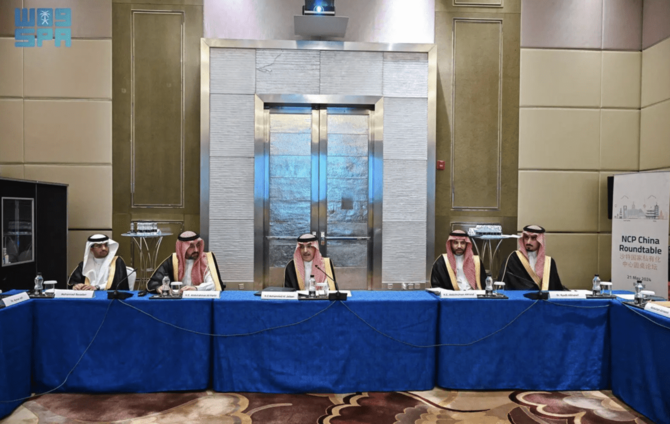
RIYADH: Chinese participation in Saudi Arabia’s private-sector projects is set to increase as the Kingdom’s Finance Minister Mohammed Al-Jadaan held meetings with top officials in Beijing.
Al-Jadaan, who is also the chairman of the National Center for Privatization & PPP, led a roundtable meeting with senior officials of Chinese companies in cooperation with the Industrial and Commercial Bank of China to discuss partnership opportunities.
In his opening address, the finance minister emphasized the depth of the bilateral relationship between the two nations, highlighting the trust and ongoing collaboration across diverse sectors, the Saudi Press Agency reported.
He revealed that the NCP has so far awarded over 60 privatization and partnership contracts in eight key sectors since its establishment, totaling a capital investment exceeding $10 billion.
Al-Jadaan also highlighted the NCP’s proactive measures in fortifying the ecosystem, including the adoption of privatization laws and complementary statutory frameworks aimed at expediting the implementation of PPP projects.
During the meeting, participants emphasized the potential for PPP - public private partnership – ventures within the infrastructure sector, outlining pathways for companies and investors to engage in these initiatives across diverse domains. Special focus was placed on construction, transportation, water management, and airport development.
At the close of the meeting, the minister commended the ICBC’s role in bolstering the NCP’s efforts to showcase privatization and partnership opportunities to Chinese investors and firms.
NCP plays a key role in facilitating the privatization program, a key priority outlined in the realization of the Saudi Vision 2030, according to its website.
The center assists in drafting regulations, establishing frameworks, and preparing government assets and services for privatization. Additionally, it is developing the privatization pipeline, proposing sectors and government assets and services for potential improvement through private sector involvement.
In 2023, the NCP unveiled its privatization and PPP pipeline, featuring 200 approved projects spanning 17 sectors. This initiative was in alignment with the objectives of Vision 2030, aiming to elevate the private sector’s contribution to the gross domestic product from 40 percent to 65 percent by 2030.
As of the same year, the pipeline encompassed over $50 billion in investments, with an additional 300 projects under evaluation, signifying promising growth prospects.


